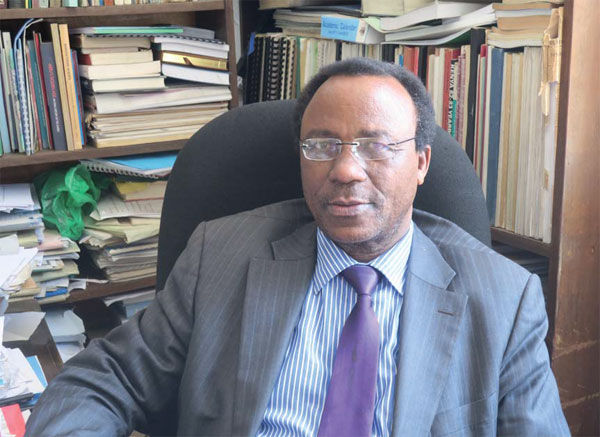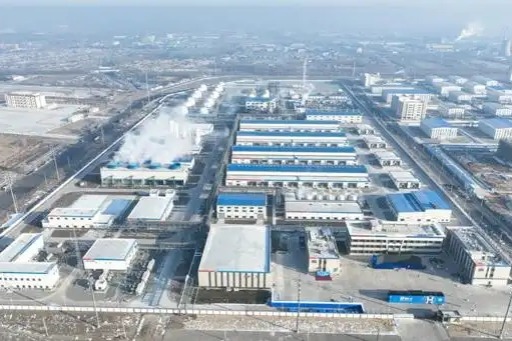China bets big on Africa's future

Seasoned former official in Kenya explains how the economic partnership will be of huge benefit to the continent
Projects that were written off as untenable by Kenya's traditional partners but snapped up by China have received a new lease of life, according to Gerrishon Ikiara, a former senior government official who served for five years in Kenya's Ministry of Transport and Communications.
The move gave the Asian giant a path into Kenya's lucrative infrastructure sector and catalyzed China's deepening of relations with other countries in the region.
| Gerrishon K. Ikiara, former senior government official says Chinese firms have raised the bar in infrastructure construction. Lucie Morangi / China Daily |
China's dominance of East Africa's transportation infrastructure has steadily increased over the years. According to a global consultancy firm Deloitte East Africa's recent construction trends report, China has funded 13 projects and has a heavy construction presence in 42 others.
Ikiara says China wisely identified a gap that had been overlooked by others:
"Kenya hinges its economic growth on modern infrastructure. Our partners, such as Japan, gave the proposals a wide berth, saying they were beyond our reach," says Ikiara, who is currently a scholar at the Institute of Diplomacy and International Studies at the University of Nairobi.
An economist by profession, he was fished out of the university in 2003 and appointed as a permanent secretary in President Mwai Kibaki's cabinet. That title changed to principal secretary when Kenya adopted its new Constitution in August 2010. Ikiara was responsible for the implementation of the country's strategic plans.
He says the partners relied on a major report carried out by international consultants that looked into the viability of developing mega projects among them a standard-gauge railway and expansion of the port. The conclusion was that the country lacked the capacity, in terms of freight transport volume - thereby making such an installation unfeasible for the next 30 years.

Funding partners shied away from the projects, arguing that they would tip the country's debt ceiling to unsustainable levels. The proposals were shelved, except for the development of the second container terminal in Mombasa port, which included a $300 million loan from Japan.
Seven years since Ikiara left office, China has transformed Kenya's infrastructure landscape. He reckons China understood the need for modern infrastructure to spur the necessary rapid economic development.
"China recognized the challenges faced by its African friends, such as a lack of financial muscle and poor technical capacity that were cutting into our growth trajectory," he says. "It could see the potential the projects had in unlocking industrialization in the next 30 to 40 years that would subsequently enable Kenya repay the loan."
What made China's loans even more attractive was the absence of conditions.
"I think this is one of China's strongest selling points, which has also endeared other African governments. China has indeed steadfastly upheld its policy of noninterference and respected African countries' dignity while partnering with them as a mutual friend. Since I left the ministry, it is no longer a question of whether it is possible, it is fait accompli."
The changing landscape has polished the continent's sheen for other global players. Just this year, Kenya played host to Israel's Prime Minister Benjamin Netanyahu, India's Narendra Modi, and Japan's Shinzo Abe, as well to South Korean President Park Geun-hye and her counterpart from Turkey, Recep Tayyip Erdogan. They have all visited Nairobi to pursue deeper trade relations.
"China has enabled Africa to dream big," Ikiara said, strongly positioning itself as a transformative partner by funding and constructing the $3.3 billion SGR, together with other major transportation infrastructure such as the $328 million eight-lane Thika Highway, which was completed in 2012, and four bypasses in Nairobi with a total value of $433 million.
"It has made it possible for us to believe in our ambitions. China has raised the bar," he says.
The 472-kilometer Mombasa-Nairobi project promises to deliver faster, safer and more reliable passenger and freight transport services.
Despite the expected benefits, it is not immune to criticisms, which Ikiara says are politically motivated.
"Politics should never interfere with development. Recent incidents have caused delays in project development and diverted the government's attention toward cooling off fires," he says. "Land prices have also tripled, making acquisition difficult, thus delaying progress while ballooning the budget."
As for concerns over quality, he says that's above board. "I know very many people who are excited when they learn that a Chinese firm has won a bid to construct a road. They know it will be done faster and with high quality."
Moreover, the majority of the projects are funded by international donor organizations, such as the African Development Bank and World Bank. This is indicative, he says, of the level of confidence multinational firms have in Chinese firms handling major infrastructure projects in Africa.
"We no longer talk about Chinese quality," he says.
The standard-gauge railroad slated to be commissioned in June 2017 will be a game changer: "It promises to have a multiplier economic effect," he says. Already, it is contributing 1.5 percent to GDP growth, "which is visibly seen along the route where residents have gained direct employment" and in capacity building through railway management and technical training, Ikiara says. "In a few years, Kenya will be exporting railway technicians to other parts of the world."
With freight moving at 80 kilometers per hour, shipments from Mombasa to Nairobi will be faster. This is significant, as Nairobi is the most advanced industrial hub in the Eastern Africa region.
"It will remodel roat transport that is currently mired by congestion, unnecessary delays and accidents to a railway that is efficient, thereby reducing logistics costs by 40 percent. It will drive the development of related industries and promote Kenya's foreign trade," Ikiara says.
Trucks that drove to Mombasa will instead pick up their cargo from newly modernized and expanded Nairobi's inland container depot that is expected to provide an additional capacity of 450,000 containers, thereby becoming a preferred point of shipment for exporters and importers using SGR. It will thus halve the freight costs for eentrepreneurs taking goods to the hinterlands such as Uganda and Tanzania.
Additionally, trucks will be available to serve local remote areas, further opening up the country. This will create an efficient and cost-friendly infrastructure network.
"You know the president of Uganda has always complained that his imports incur high costs on the roads," Ikiara says. "With the SGR, this will be significantly reduced, making the regions products much more competitive."
With competition heating up in the region as Tanzania expands and modernizes its ports, Ikiara says, efficiency will be the determining factor of which route a country chooses.
"Hinterlands such as Uganda, Rwanda and Burundi will choose the most efficient route available to enable them to save on costs. But all these ports are a huge plus to the region."
He firmly believes that these installations augur well for China's Belt and Road Initiative. He says China's move to promote connectivity and cooperation will boost Africa's global trade participation. And he believes it is complementing the continent's goals prescribed in the African Union's Agenda 2063 plan.
But while the region strives to meet its infrastructure demands, concerns about debt sustainability have arisen and escalated with the tumbling of commodity prices such as oil.
"Concerns that we are in a debt crisis because of borrowing heavily from China to fund our infrastructure are unfounded," Ikiara says. "These projects are long-term and will drive economic expansion that will enable us pay back our debts. Our government only needs to maintain macroeconomic stability, such as holding the inflation rate below double digits and avoiding political instability."
lucymorangi@chinadaily.com.cn
(China Daily Africa Weekly 10/21/2016 page32)
Today's Top News
- Experts: Lai not freedom fighter, but a pawn of the West
- Hainan evolves as gateway to global markets
- Opening up a new bridge between China and world
- Tour gives China-Arab strategic trust a boost
- China accelerates push for autonomous driving
- Opening of new gateway can help foster global economic and trade cooperation































